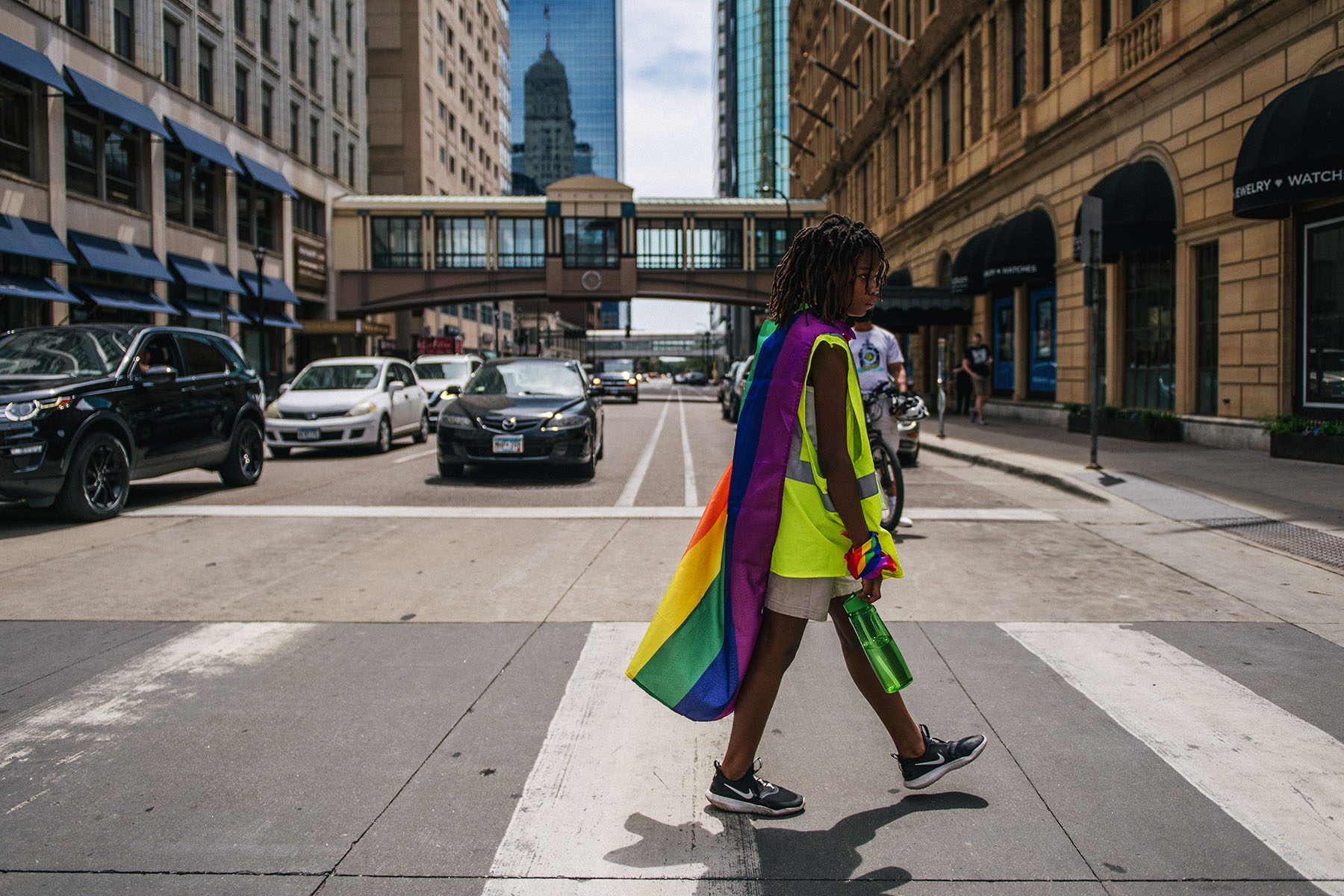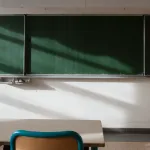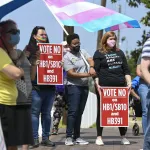Since the start of the new school year, school districts in states such as Utah, Oregon, Missouri and Florida have banned Pride flags as a political symbol and ordered teachers to remove them from their classrooms. In some cases, as in Indiana, parents’ complaints seem to be driving the crackdown.
But this labeling and banning of the flags sends a message beyond politics. Experts tell The 19th that removing Pride flags from classrooms could have dire mental health effects on LGBTQ+ students, many of whom are still in the early stages of navigating their identities and looking for signs of acceptance from the adults around them.
The stakes are high — 70 percent of LGBTQ+ youth who responded to the Trevor Project’s latest annual survey said their mental health was “poor” most of the time or always during the pandemic, and 42 percent seriously considered suicide.
LGBTQ+-affirming schools are also a crucial link in suicide prevention, older data from the Trevor Project shows. Schools with welcoming spaces had an outsized effect on lower suicide attempts among youth when compared with LGBTQ+-affirming homes and workplaces.
Ryan Watson, an associate professor at the University of Connecticut who has researched the experiences and health risks facing LGBTQ+ teenagers, said closeted students are especially vulnerable when Pride flags are taken down.
“One of the biggest downsides” of the policies, he said, “is the inability for youth who are not out to know where they can be safe, and who they could talk to in an emergency, or who they can first come out to and not lose resources or safety.”
Watson, and Austin Johnson, who teaches sociology at Kenyon College and studies LGBTQ+ health, said research has established that students with access to Gay-Straight Alliances experience decreases in depression, substance abuse and self harm, plus increases in self-esteem and overall health. While research has not proved that Pride flags affect mental health, they both said that is a similar signal.
“I would feel strongly about extending that to things like Pride flags,” Watson said, since the flags serve as another signal that a welcoming space is available.
A Florida teacher in St. Johns County, who currently teaches 7th and 8th grade, told The 19th that she’s concerned about her own students being invalidated — especially those who aren’t out.
The teacher, who asked to remain unidentified because she did not want to endanger her job, said she started to hang large Pride flags in her classroom at the start of the new school year, starting with a transgender pride flag that a student had asked to bring in from home.
“As soon as that flag went up, obviously, there was conversation and other kids were like, ‘Oh, can I bring in my flag, too?’”
A student’s lesbian pride flag, taken from her mom’s house, came next, followed by a student who brought their bisexual flag from home. Another kid brought a pansexual flag into class to hang up. Nonbinary and LGBTQ+ Pride flags eventually followed.
The teacher said she was told by the school to remove the students’ flags last week, since they’re considered a political statement. School administrators did not respond to requests for comment, although the county superintendent’s office confirmed the incident.
The teacher shared photographs of the flags as they had hung in her classroom, as well as students’ homemade Pride drawings made in protest of the flags being taken down. Local parents criticized the removal in a private progressive Facebook group in screenshots that the teacher also shared with The 19th.
Kyle Dresback, the associate superintendent for student support services in St. Johns County, said any local school barring Pride flags is following a county board rule that bans employee political activity. In this most recent case, the school principal enforced that rule after seeking guidance from the district, he said.
“Pride flags, [Thin] Blue Line, Black Lives Matter, they’ve all tried to come into the district and we’re trying to keep the schools as safe as possible,” he said.
He said that while students are free to wear or display Pride flags, district employees tasked with taking care of students have to be careful to follow school board rules.
“A flag doesn’t make an environment safe,” Dresback said. Teachers should be connecting with their students and showing them that they have “a trusted adult that they can go to” in other ways, he said.
“It’s not a flag that helps us get better, it’s having conversations,” he said.
Johnson said that it’s not just about a flag — it’s about the message sent once it’s taken down.
“If they’re up and they’re forced to take them down, the message is clear that there’s no welcome symbol in that space,” he said. An LGBTQ+ flag in a teacher’s classroom is a sign that students can come to them for support — even if they never need it, they have the safety in knowing that it’s there, Johnson said.
When he saw LGBTQ+ flags displayed yesterday on his campus, Johnson said he thought of the loneliness he felt in high school, as one of the only out queer students.
“Had I just seen that flag, I think it would’ve felt different to me,” he said.
In Westfield, Indiana, parents are still pushing for the school district to keep Pride flags and Black Lives Matter signs in the classroom, after the superintendent began calling for teachers to remove them at the start of the school year.
Alishia Hunter, who has two children attending Westfield High School, is part of a newly formed Gay, Lesbian and Straight Education Network (GLSEN) chapter that has protested the flag’s removal. She told The 19th that her son, a freshman at Westfield who is transgender, has tried his best to ignore the whole situation and lean on friends for support.
“Quite honestly, it frightens me that my son is there,” she said. The current fight in her district, she said, grew in part from parents’ complaints in the spring over local elementary schools providing library books about transgender people.
Whether public schools can face legal penalties for restricting teachers’ expression in the classroom — like telling them to take down Pride flags — is an open question, although existing court precedent tends to favor educational institutions, legal experts tell The 19th.
“In this situation, K-12 schools have a lot of leeway in what they can do,” said Gautam Hans, associate clinical professor of law at Vanderbilt Law School who studies the First Amendment.
Anya Marino, clinical instructor at Harvard Law School’s LGBTQ+ Advocacy Clinic, agreed — but stressed that “regardless of whether it’s legal, it’s certainly bad policy and can actually harm students.”
Banning LGBTQ+ flags may drive higher rates of bullying, which would in turn worsen anxiety and depression among a population that is already vulnerable, Jack Turban, a fellow in child and adolescent psychiatry at Stanford University School of Medicine, wrote in an email.
Monica Ghabrial, who has a doctorate in philosophy and is studying trans and nonbinary health at Western University, wrote over email that removing Pride flags — which removes signs of a welcoming environment — could increase LGBTQ+ students’ risk of poor responses to stress, both emotionally and physically.
Removing Pride flags tells “youth who are out that they are not safe and, for those who are not yet out, it’s a message to stay all the way in” the closet, Ghabrial said.
In St. Johns County, Florida, the teacher forced to take down her Pride flags said sixth graders at the school sent notes of appreciation about the flags.
When she feels discouraged, reading those notes from sixth graders — a group she doesn’t even teach — makes her feel like the job is worth it, she said.







